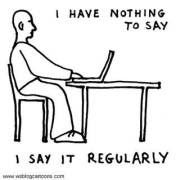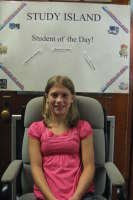Once they are assigned, students are responsible for WTC and Vocabulary words in all of their writing. They also have writing assignments using the WTC and Vocab words.
Week 1
WTC Sincerely--I
sincerely hope you do well.
because--She ran
because she was afraid.
Laurelville--Laurelville Elementary is my favorite school.
write/writing--Please
write your first and last name.
right--Did you make the
right choice?
your--We went to
your house.
you’re--You're allowed to go to the movies.
VOCAB responsibility--The Reading Log is your
responsibility.
strategy--Do you have a
strategy for success?
blurb--The
blurb tells what the a little bit about the book.
monitor--The teacher
monitored your progress.
______________________________________________________________
Week 2 WTC there--Sit over
there.
their--They went to
their grandmother's house.
they’re--They're going tonight.
where--Where do you live?
wear--Wear your new coat to school.
we’re--We're going to lunch now.
were--We
were late for school.
VOCAB specific--Be
specific when you describe your thoughts.
details--Use
details to explain your idea.
memory--My
memory is fading.
memoir--We are writing a
memoir.
______________________________________________________________
Week 3WTC aloud--Read
aloud to your partner.
allowed--Are you
allowed to go to the game?
very--She is
very smart.
vary--The student's ages
vary.
peace--She painted a
peace sign.
piece--I want a
piece of pizza.
VOCAB
revise--Did you revise your letter?
difficult--The job was
difficult.
important--Listening in class is
important.
______________________________________________________________
Week 4WTC
through--Walk
through that door.
threw--David
threw the ball
thought--Jill
thought of the answer.
chews--She
chews her food with her mouth closed.
choose --Choose a team to join.
wait--Wait for the bell to ring, before switching classes.
weight--His
weight is going down.
VOCABdifferent--What
different types of pizza do you like?relationship--What is the
relationship between the two?
describe--Describe how the boy solved the problem.
______________________________________________________________
Week 5WTCsince--He has waited
since yesterday.
sense--Do you have a
sense of humor?
a lot--A lot of times, students spell
a lot as one word.
whose--Whose notebook is this?
who’s--Who's packing today?
VOCABcontext--Use
context clues to figure out the word.
connect--Connect the pieces together.
connection--What
connection do you have?
accomplish--What do you want to
accomplish in sixth grade?
______________________________________________________________
Week 6WTClets--My mom
lets me go to the movies.
let’s--Let's go to Village Cafe.
usually--Usually we eat breakfast there.
probably--She will
probably do her homework.
quite--She was not
quite tall enough to ride the ride.
quiet--"Quiet," said the teacher.
VOCABgist--The
gist is the main point of the essay.
skim--Do you
skim for key words?
skimming--We practice
skimming in Reading Workshop.
summarize--Summarize the article in two paragraphs.
______________________________________________________________
Week 7WTCexample--Give an
example to support your opinion.
examine--Examine your essay for mistakes.
express--Express your opinion in your journal.
extend--Extend the answer with more details.
feature--The problem is the best
feature of the story.
future--Thinking about the
future is exciting.
VOCABpredict--Predict what will happen next.
respond--Respond to the question on the board.
compare--Compare the main character with yourself.
contrast--Contrast the main character with yourself.
______________________________________________________________
Week 8WTCpossible--Anything is
possible.
positive--A
positive attitude helps you succeed.
position--Knowing your
position in the election is important.
purpose--The
purpose of the journal is to share your thoughts.
cause--The
cause of the accident was unknown.
continue--Continue to read your SSR book.
VOCAB
emphasize--Emphasize your main point in the essay.
organize--Organize your answer by the sequence events occurred.
instant--It happened in an
instant.
indicate--The author
indicates his opinion throughout the essay.
______________________________________________________________
Week 9WTCaccept--Did you
accept the gift?
except--Everyone
except for one girl was present.
break--Let's take a
break.
brake--Put on the
brake at the curve.
meet--Meet me after school today.
meat--The
meat they served was ham.
VOCABquality--The
quality of the essay was excellent.
quantity--The
quantity of books was more than expected.
audience--The
audience listened closely.
attitude--Her
attitude was excellent.
______________________________________________________________
Week 10WTC
straight--Go
straight home after school.
strait--The ship went through the
strait.
reason--Give three
reasons for the delay.
result--The
results were different than expected.
react--She
reacted with surprise.
report--Report to class immediately after recess.
VOCABsequence--Do you know the
sequence of events?
sort--Sort out the topics by genre.
select--Select the gist from the choices listed.
selection--Read the
selection to your partner.
______________________________________________________________
Week 11WTCweather
whether
color
collar
guess
equal
VOCABimagine
contain
create
creative
______________________________________________________________
Week 12WTC
follow
farther
familiar
famous
actually
already
VOCABvarious
variety
evaluate
evaluation
______________________________________________________________
Week 13WTC
appear
article
arguement
around
built
business
VOCABacquire
acqisition
anticipate
develop























